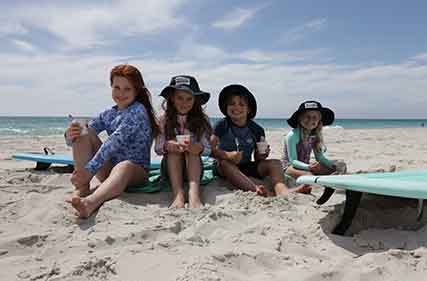
Studies suggest 90% of Australian consumers are concerned about sustainability[2] with all age segments having the view that businesses and brands should be most responsible for the impact on the environment.
Australia’s oldest dairy Brownes is making a change for the better with new yoghurt tubs made from ocean bound plastic – which is described as plastic that’s found within 50 kilometres of Australia’s coastline.
In addition to using ocean bound plastic, the new yoghurt tubs will also be fully recyclable by kerbside waste management operators.
The initiative will be an important step in preventing ocean waste, with projections that by 2050 the world’s oceans will carry more plastic than fish (by weight).[1]
“Brownes Dairy is showing our commitment to sustainability through action. We were first to introduce Australia’s most sustainable milk cartons and we wanted to push the envelope again by using recyclable ocean bound plastic in our yoghurt tubs,” said Brownes Dairy CEO Natalie Sarich-Dayton.
Brownes has partnered with companies including Heng Hiap Industries and PakPot, which are certified by Zero Plastic Oceans, which is an NGO dedicated to addressing plastic pollution.
“Working with certified partners not only prevents plastic waste from ending up in the ocean, it also creates employment opportunities for underprivileged coastal communities,” said Ms Sarich-Dayton.
By switching to ocean bound plastic yoghurt tubs, about 2.7 million virgin plastic tubs per year will no longer be created.
“Brownes Dairy wants to ensure that the next generation of Australian families not only get to enjoy the goodness and freshness of our products, but they can do so knowing we use the most sustainable yoghurt tubs available,” said Mrs Sarich-Dayton.
In addition to the sustainable yoghurt tubs, Brownes is also transitioning the CHILL 750ml Flavoured Milk bottle range to 100% recycled plastic.
Studies suggest 90% of Australian consumers are concerned about sustainability[2] with all age segments having the view that businesses and brands should be most responsible for the impact on the environment.
As part of its sustainability focus, Brownes has also partnered with Trillion Trees, an environmental replenishment not-for-profit organisation, to contribute to the Trillion Trees Challenge. The organisation has been active since 1979 in Western Australia and has planted close to 15 million native trees.
Since 2016, Brownes has also been an active signatory of the Australian Packaging Covenant Organisation (APCO), which is a packaging value chain that collaborates to keep packaging materials out of landfill and retains the maximum value of the materials, energy, and labour within the local economy.
[1] The World Economic Forum and the Ellen MacArthur Foundation, Rethinking the future of plastics, 2016
